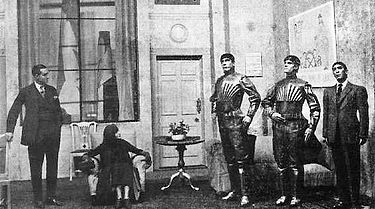R.U.R.
| R.U.R. | |
|---|---|

A scene from the play, showing three robots
|
|
| Written by | Karel Čapek |
| Date premiered | 25 January 1921 |
| Original language | Czech |
| Genre | Science fiction |
R.U.R. is a 1920 science fiction play by the Czech writer Karel Čapek. R.U.R. stands for Rossumovi Univerzální Roboti (Rossum’s Universal Robots). However, the English phrase Rossum’s Universal Robots had been used as the subtitle in the Czech original. It premiered on 25 January 1921 and introduced the word "robot" to the English language and to science fiction as a whole.
R.U.R. quickly became famous and was influential early in the history of its publication. By 1923, it had been translated into thirty languages.
The play begins in a factory that makes artificial people, called roboti (robots), from synthetic organic matter. They are not exactly robots by the current definition of the term; they are living flesh and blood creatures rather than machinery and are closer to the modern idea of clones, they may be mistaken for humans and can think for themselves. They seem happy to work for humans at first but a robot rebellion leads to the extinction of the human race. Čapek later took a different approach to the same theme in War with the Newts, in which non-humans become a servant class in human society.
R.U.R. is dark but not without hope and was successful in its day in both Europe and North America.
Parentheses indicate differences in translations.
Helena, the daughter of the president of a major industrial power, arrives at the island factory of Rossum's Universal Robots. She meets Domin, the General Manager of R.U.R., who tells her the history of the company:
In 1920 a man named Rossum came to the island to study marine biology, and in 1932 he accidentally discovered a chemical that behaved exactly like protoplasm, except that it did not mind being knocked around. Rossum attempted to make a dog and a man, but failed. His nephew came to see him, and the two argued non-stop, largely because Old Rossum only wanted to create animals to prove that not only was God not necessary but that there was no God at all, and Young Rossum only wanted to make himself rich. Eventually, Young Rossum locked his uncle in a laboratory to play with his monsters and mutants, while Young Rossum built factories and cranked out Robots by the thousands. By the time the play takes place (in the 1950s or 1960s, presumably), Robots are cheap and available all over the world. They have become absolutely necessary because they allow products to be made at a fifth the previous cost.
...
Wikipedia
